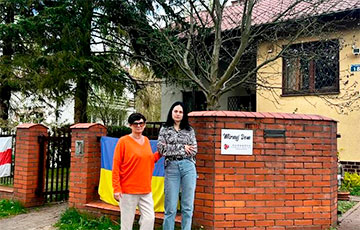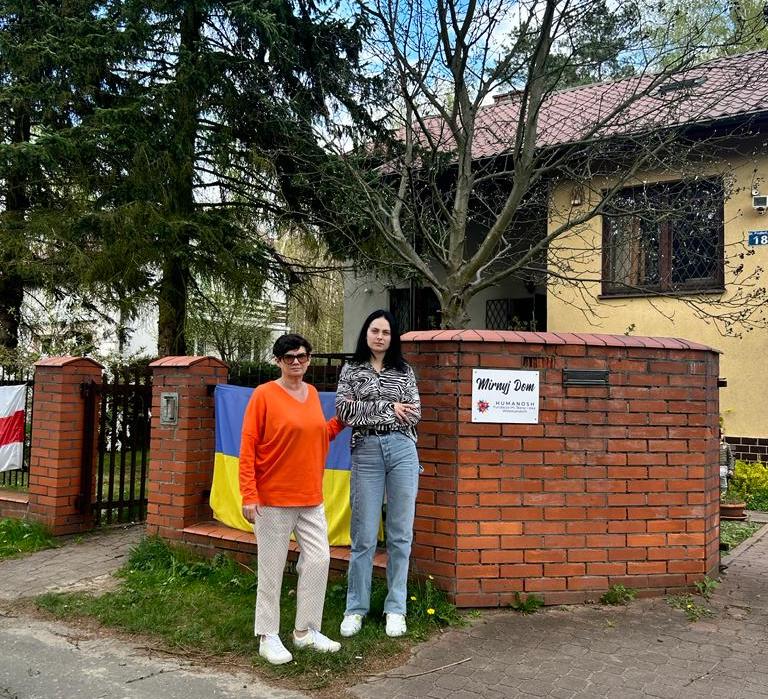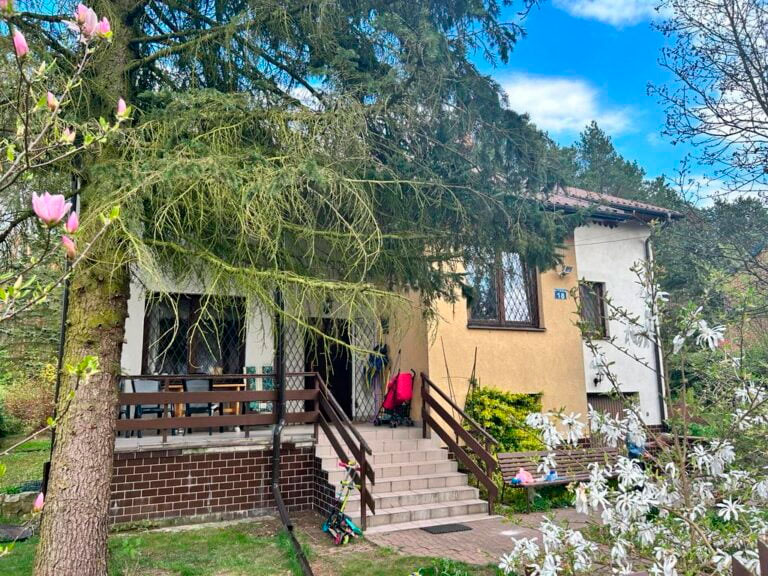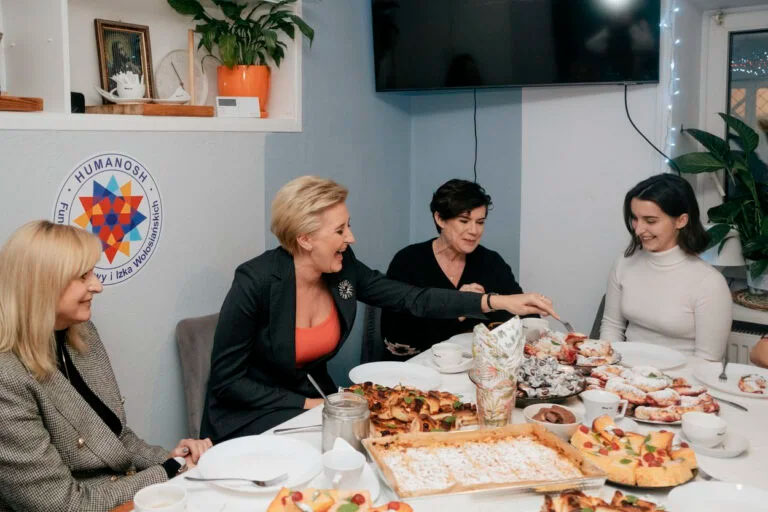‘One Of The Rules Is That We Never Ask What People Went Through In Belarus’
4- 29.07.2023, 18:22
- 11,818

How a Polish family has been helping Belarusians for three years.
Many Belarusians who went through repressions and left for Poland know the family of Piotr and Katarzyna Skopcew. Their Mirnyj House project has been helping our compatriots for three years now.
In an interview with the Charter97.org website, project manager Maria Makar told how the Mirnyj House was created, what problems people come to them with, and how real Polish solidarity looks like.
— Tell us about Katarzyna and Piotr Skopcew, who created the Mirnyj House. What kind of people are they?
— I'll start with the fact that Piotr has Ukrainian and Belarusian roots. Together with his wife Kasia, in 2020 they created the Humanosh Foundation in order to help Belarusians, they responded to the situation after the presidential elections. Moreover, they learned about everything randomly — from their eldest daughter, who at the university heard the stories of Belarusian students. They began to figure out, to ask what was going on.
Kasia and Piotr hosted Belarusians at their homes even before the opening of the project. For half a year, even more, different people lived with them, who were forced to flee from Belarus. In May 2021, the Mirnyj House project was officially opened.
Kasia and Piotr have their own businesses: firms, shops, pharmacies. I have known them since 2021, when I needed help and ended up in Mirnyj House as a refugee. I can say that they give most of their lives, their time to the fund.
Initially, it was opened only to help Belarusians and only for one project, but at the moment the fund is open not only in Poland. Now the project is engaged in medical care on the territory of Ukraine. If at first there was only one Mirnyj House, now there are four of them, there are also apartments in Warsaw and Łódz, which are used to settle and help refugees from both Belarus and Ukraine.
— Tell us more about how the family of Katarzyna and Piotr helped the Belarusians.
— In 2020, there was an urgent need for housing, when people began to leave Belarus en masse. As I said, initially they received people at their homes, then it was decided to rent the first house, where they immediately began to settle Belarusians who were forced to leave the country. They have always lived for free, now this project also works free of charge.
Mirnyj House accepts both Belarusian and Ukrainian refugees, we have no division, they live together.
In addition to providing a roof over their heads, every day we try to create a special atmosphere in the houses so that people feel peaceful, like at home, they understand that they are safe. We also have the possibility of psychological support. When former political prisoners arrive, we look closely at the state of the people, how they behave, whether they are silent or open, we always have the possibility of psychological assistance.

We also provide complete information on legalization, filing documents for international protection, especially for refugees from Belarus. We tell and show everything, down to the smallest detail, because there are people who come to Poland for the first time and absolutely do not understand the language, do not know what PESEL is (personal identification number in Poland — edit.)
Again, I want to focus on the fact that when former political prisoners arrive, very often they are in such a state that at first they just need to be given time to exhale, rest, and we help people recover.
There are people who come and quickly join in life, start looking for a job, go to Polish language courses, deal with documents. And there are people who find it difficult, so we always provide, as Kasia says, family support, we lend a family shoulder. Kasia and Piotr always come to meet people at home, talk to them, speak about themselves.
We do not have any official structure of work, there is more a family policy that everyone adheres to in the Humanosh Foundation. As I said, we also help with jobs. One of the businesses of Kasia and Piotr is a store, and for more than a year now several guys have been working there, who once lived with us in the Mirnyj House and needed work.
Kasia and Piotr, as well as their four children, work together with us in the foundation, this is a very family business. They take refugees to their jobs, invite them to some holidays, Kasia and Piotr organize various joint events, evenings, talk about the culture of Poland, try to speak Russian in order to somehow show their respect.
We inform about the opportunity to take Polish language courses, some free training. We help with the placement of children in schools, as certificates are often needed to confirm the place of residence so that mothers can send their children to study. In the most difficult situations, especially when they are large families, we help with renting an apartment.

Help is quite individual, depending on what the person needs, and what their situation is.
In one of the houses there is a permanent men's room where political refugees from Belarus are accepted. Basically, all our rooms are family rooms, but there has always been a men's room, because a huge number of men come from Belarus, this is an urgent need.
Those living in our houses know that on some individual issues you can always openly call Kasia, Piotr, you can talk to me, since I am the head of the Mirnyj House project and work in all houses.
What problems do people come to Mirnyj House with?
Help can be different. Someone arrives without things, needs absolutely everything, because a person fled with one backpack, while someone just needs help with finding housing.
But, for example, over the past few months, almost all refugees from Belarus who live in the men's room are former political prisoners. Very few people simply apply because they just arrived on a humanitarian visa. If they are men or guys, in most cases they have gone through prison. The atmosphere in the men's room shows that it's hard enough for people to talk about it.
We have one such little house rule — it is undesirable to raise political topics in general places. There was a case when guys were sitting in the yard and discussing something of their own, sharing how they were in prison. Then a family from Belarus lived in our house, of course, also political. A teenage girl overheard this conversation and had a tantrum, a small nervous breakdown. Some find it hard to listen to such things, people come with a slightly different worldview.
We never ask, we never force anyone to tell what people have gone through in Belarus. Sometimes they themselves come and share, because they want to tell. Sometimes people come to us and can just live silently for a month, say hello, go out to eat, and a month later they report that they are leaving.
Sometimes it can be seen that the Belarusians who come after imprisonment feel much better in the Mirnyj House. They feel supported, because there are people here who understand where they came from, what condition they are in. We create a homely atmosphere: we try to celebrate some holidays together, make barbecues, and celebrate birthdays. It helps because I see which people come to me and which people leave in a month.

Last year, we had a situation where three Belarusians, who were first forced to leave for Ukraine because of politics, and came to Poland with the outbreak of the war, met each other and found an apartment together. We helped them with a deposit for rent and, as far as I know, the guys still live together and are friends. This is also such a small pride for us that people here get to know each other and find support.
Internal help is still working here, because people are in a calm atmosphere. Now, when there are already four such houses, when assistance has been provided for three years now, we know how to create a family atmosphere so that people just automatically become calm.
You can support the Mirnyj House project:
PLN
Please send your donation in Polish Zloty (PLN) to the following foundation's account
PKO BP account number: PL25 1020 4900 0000 8202 3295 3560
PKO Bank Polski SA BIC code: BPKOPLPW
Name: Humanosh Foundation named after Sława and Izek Wołosiański
Address: Zdynia 59, 38-315 Uście Gorlickie
NIP: 738-216-04-03
REGON: 386219430
KRS: 0000844394
EUR
Please send your donation in euros (€) to the following foundation's account.
PKO BP account number:
PL03 1020 4900 0000 8302 3407 6682
PKO Bank Polski SA BIC code: BPKOPLPW
Name: Humanosh Foundation named after Sława and Izek Wołosiański
Address: Zdynia 59, 38-315 Uście Gorlickie
NIP: 738-216-04-03
REGON: 386219430
KRS: 0000844394
USD
Please send your donation in US dollars ($) to the following foundation's account.
PKO BP account number:
PL64 1020 4900 0000 8802 3407 5145
PKO Bank Polski SA BIC code: BPKOPLPW
Name: Humanosh Foundation named after Sława and Izek Wołosiański
Address: Zdynia 59, 38-315 Uście Gorlickie
NIP: 738-216-04-03
REGON: 386219430
KRS: 0000844394
You can support the Mirnyj House project here









